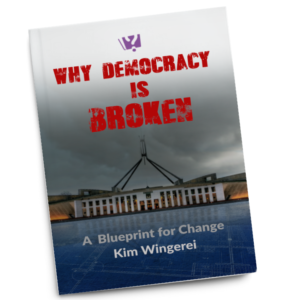
The PwC multinational tax avoidance scandal has led to a slew of parliamentary inquiries, reports and much handwringing. The latest includes no less than 40 recommendations. But will anything change? Kim Wingerei reports.
The Parliamentary Joint Committee on Corporations and Financial Services has published its report. That committee’s remit is ASIC and the operation of corporate legislation.
Back in June, the Senate’s Standing Committee on Finance and Public Administration’s reported from its “Inquiry into Management and Assurance of Integrity by Consulting Services Management.”
Both reports go wider than the scandal that precipitated them. Neither do much to address the core issues of how the Government has made itself dependent on consultancies, reduced the public service to contract management functionaries while outsourcing competencies to rent-seekers, and failed to put in place appropriate checks and balances.
According to a 2024 Parliamentary report, “In 2022–23, the Australian Government published 83,625 procurement contracts with a combined value of $74.8 billion. Management Advisory Services, typically provided by consulting firms, had a value of $3.272 billion in 2022–23, which represents 4.37 per cent of the total value of procurement contracts.”
The vast majority of the consulting contracts go to the ‘Big 4’ consultancies, EY, Deloitte, KPMG and PwC, who are all large donors to both Liberals and Labor.
The Morrison Government spent $20.8B on consultants. Labor claims to have reduced that spending by $624m a year since coming to power.
The Corporations and Financial Services Committee commenced its inquiry “ethics and professional accountability” in June 2023, receiving 83 submissions plus follow-up questions and met 12 times between October 2023 and September 2024. The resulting report includes 40 recommendations, the first being that PwC should continue to be banned from tendering for government work until all the other investigations into its practices have been concluded.
So far, so good. Except, of course, that PwC “spun off” its government practices to new company Scyne Advisory, who, according to the AFR ($), quickly clawed back a third of the contract revenue that PwC lost. Former PwC CEO Luke Sayer, one of the senior partners deeply mired in the scandal, is also known to continue to benefit from government contracts at the consultancy he now runs, the Sayer Group, which in June has 28 contracts with the federal government and its agencies, according to the Austender portal.
Partnership or corporation?
Another recommendation is that the number of partners in partnerships be limited to 400 to align with legal partnerships. That would cause some pain for PwC, which has over 900 partners in Australia, especially for the 22 new partners admitted in July this year. EY has 738 partners, KPMG ‘over’ 600, with Deloitte the only one under the proposed new bar with 360. They’ll have five years to comply and be “subject to review”, so we’re guessing that nobody’s partners have been losing sleep at the prospect of a demotion just yet.
The Opposition members of the committee, Alex Hawke and Paul Scarr, dissented strongly from this recommendation, noting that “a cut in the number of partners would cause great disruption to those firms which currently have more than 400 partners.”
The Greens representative, on the other hand, wanted to go further, suggesting a cap of 100 partners, citing Mr Adam Powick, CEO of Deloitte (who) has acknowledged that “once a partnership gets above 100 equity partners, it becomes too complex to manage.”
The partnership model has many benefits. In particular, they are exempt from the governance and accountability requirements of the Corporations Act. Recommendation 5 suggests that this ‘should’ change for partnerships with over 3,000 staff. But only if it’s OK by ASIC, who, as we know, has so many other complicated matters to attend to, including the fending-off of government reports calling for it to be abolished.
ASIC obfuscates, dithers and delays at Senate Estimates. What’s the scam?
There are several other recommendations along the same lines of making the ‘Big 4’ subject to disclosure, transparency and audit requirements similar to those applying to large corporates and other government contractors. Why they are not already has long been a point of conjecture here at MWM.
The most obvious recommendation of all is that “the Australian Government consider requiring audit firms, or the audit section of multidisciplinary firms, to incorporate.” ‘Big 4’ lobbyists are no doubt ready to take that fight to Canberra.
Structural or operational separation
One of the major issues laid bare by the PwC scandal was the muddled lines between the company’s divisions of audit, tax advice and consultancy.
Recommendations 8 and 9 suggest that “multi-disciplinary large accounting firms should not be permitted to supply both audit and non-audit/consultancy services to the same client” and that they “should be required to implement operational separation of their audit practice from their non-audit practice.”
The firms themselves, of course, will insist that this is not necessary because that is already their practice. As is the flying of pigs.
Other recommendations expand on this theme, with suggestions for better audit practices (sic) and more transparency, while the Greens stressed the importance of structural over just operational separation, with Barbara Pocock stating, “structural separation is an alternative, firmer way to ensure the integrity of the audit system and guarantee that audits are not compromised by non-audit services, creating conflicts of interest.”
The problem with PWC and the Big 4 – treason is the business model
Fragmented oversight
The fragmented regime of corporate regulation and oversight in Australia is on display in the report in recommendation 22:
“The committee recommends that the Australian Government consider additional mechanisms to ensure the Financial Reporting Council and any related standards boards, the Companies Auditors Disciplinary Board, the Australian Securities and Investments Commission, the Tax Practitioners Board, and the Australian Taxation Office and other government regulatory bodies are independent and are seen to be independent, including by ensuring that the bodies do not include individuals with a current financial interest in entities under the direct governance of the body.”
That’s a lot of bodies with overlapping interests and people to control not to mention their ability to claim “not in our purview” – and the list doesn’t even include the Professional Standards Council and its cousin, the Accounting Professional and Ethics Standards Board.
The Committee even suggest that there should be another such body, “creating a consultancy code and associated consultancy code compliance body (with sufficient powers to ensure compliance with the code).”
They’ll need more consultants to sort it all out!
Or maybe that’s the reason for recommendation 33, that the “Australian Government and professional bodies develop mechanisms to enhance the transfer of misconduct information between regulators and all relevant professional bodies.”
Whistleblower protections
The PwC scandal took many years to surface and only came to light when journalists got wind of a determination made by the Tax Practitioners Board, censuring PwC tax partner Peter Collins. Collins turned out to be just one of many who knew about PwC providing advice to clients based on confidential material from the ATO.
The committee recognises that there were a large number of people who were either involved or who knew what happened long before it became public, suggesting that a stronger whistleblower regime is paramount.
It recommends greater alignment of whistleblower protections across public and private sectors, applies to audit, accounting and consulting firms, and offers greater protection and support for whistleblowers.
We second that and wait with bated breath…
Lendlease whistleblower and lawyer Tony Watson – the law is failing to protect whistleblowers


